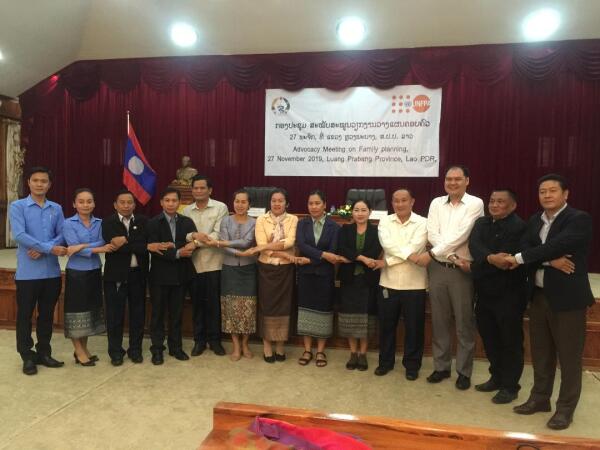UNFPA Laos convened a family planning advocacy meeting in Luang Prabang Province in Lao PDR to garner support from relevant sectors to jointly address the unmet needs of family planning in Laos.
Around 100 participants from eight provinces in the northern region of Lao PDR attended the meeting, including members from health, education, youth union, women’s union and the Lao Front for Constructions.
The meeting was held soon after the Nairobi Summit on ICPD25, when governments and partners made bold commitments to transform the world by ending all maternal deaths, unmet need for family planning and gender-based violence and harmful practices against women and girls by 2030.
At the Nairobi Summit, the national government of Lao PDR pledged strong support to the Nairobi Statement and reiterated its commitments to further advance the ICPD PoA and 2030 Sustainable Development Agenda. The national commitments from Lao PDR included targets and plans of programme actions towards ensuring rights and choices for all in the country. One of the commitments was the specific goal to end unmet need for family planning, including among adolescent girls, by 2030.
At the opening, Dr. Phonepaseuth Ounaphom, Deputy Director of Department of Hygiene and Health Promotion, Ministry of Health, highlighted that the government aims to ensure family planning for everyone, not only for parents or couples but for all people regardless of their sex, gender, background, social or economic status. He stressed that the government will continue to highlight the importance of family planning in the upcoming 9th national social and economic development plan (9th NSEDP). To fulfill the renewed commitments on ICPD25, relevant sectors at all levels must act together to ensure family planning information and services reach the most vulnerable.
Ms. Mariam Khan, UNFPA Representative to Lao PDR, reiterated that family planning is central to women’s empowerment, reducing poverty and achieving sustainable development. She stressed that universal access to family planning leads to the reduction of school dropouts, breaking the cycle of poverty, tackling malnourishment, and delaying early pregnancy. For all individuals to unleash the full potential, and for the country to reap demographic dividends, family planning is the bedrock for Lao PDR’s graduation from the Least Development Country status and achievement of sustainability in the long run.
While committing UNFPA’s continued support in closing the gaps in family planning across the country, Ms. Mariam Khan stressed that all stakeholders at all levels must join hands together with different roles in the provision of information and services, particularly to reach the most vulnerable, including adolescent girls and those left behind due to economic and cultural barriers.
In Lao PDR, about 15 percent of married women would like to plan childbearing but are not able to use the modern method of contraception. Unmet need is high particularly among young women, women with no education and the poorest women With 75 percent of girls aged 15-19 having no access to family planning, the adolescent birth rate in Laos remains the highest among the region, with 1 in 10 girls aged 15-19 have already begun childbearing.
Participants reached the consensus that investing in family planning not only empowers individuals to choose whether and when to have children, but it also helps to reduce poverty, reduce maternal mortality, improve health outcomes, and promote gender equality. They proposed more effective ways of utilizing existing mechanisms for multi-sectoral cooperation among members of provincial commissions for mother and child health.
Recognizing the acute needs to reduce the adolescent birth rate, participants proposed to enhance efforts to support families to keep young people to stay in schools.
Lao Women’s Union representative has pledged to take measures to build the capacity building of its local staff to provide correct messages on family planning and reproductive health to community members.
Lao Youth Union proposed to establish a peer education system among young people and to expand adolescent friendly services. They also suggested using more attractive ways to engage young people when delivering family planning and reproductive health information, such as using multimedia channels.
Participants from the education sector suggested enhancing teachers’ capacity to communicate with young people on sexual and reproductive health topics, including family planning.
In line with consensus and proposed actions, UNFPA will reinforce the support of facilitating the multi-sectoral mechanism to effective coordination among different stakeholders. In the meantime, UNFPA will strengthen capacity building and technical support required by the partners at the local level to expand reach to the community members, especially adolescent girls and young people.
To assist the government in fulfilling its ICPD25 commitments, UNFPA will continue to step up its efforts in expanding partnerships with diversified parties for innovative solutions. For instance, to extend the coverage of reproductive health information and services to young people, particularly adolescent girls, UNFPA has rallied a number of new partners with complementary areas of expertise, such as media outreach, financial and technical support, life skills and empowerment of girls.


